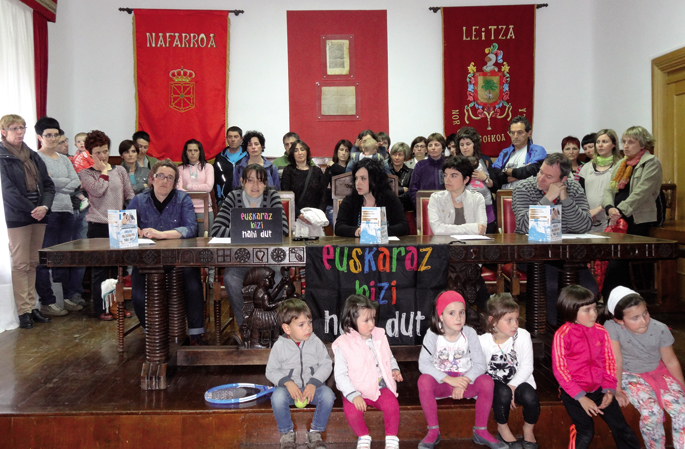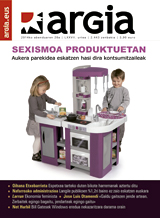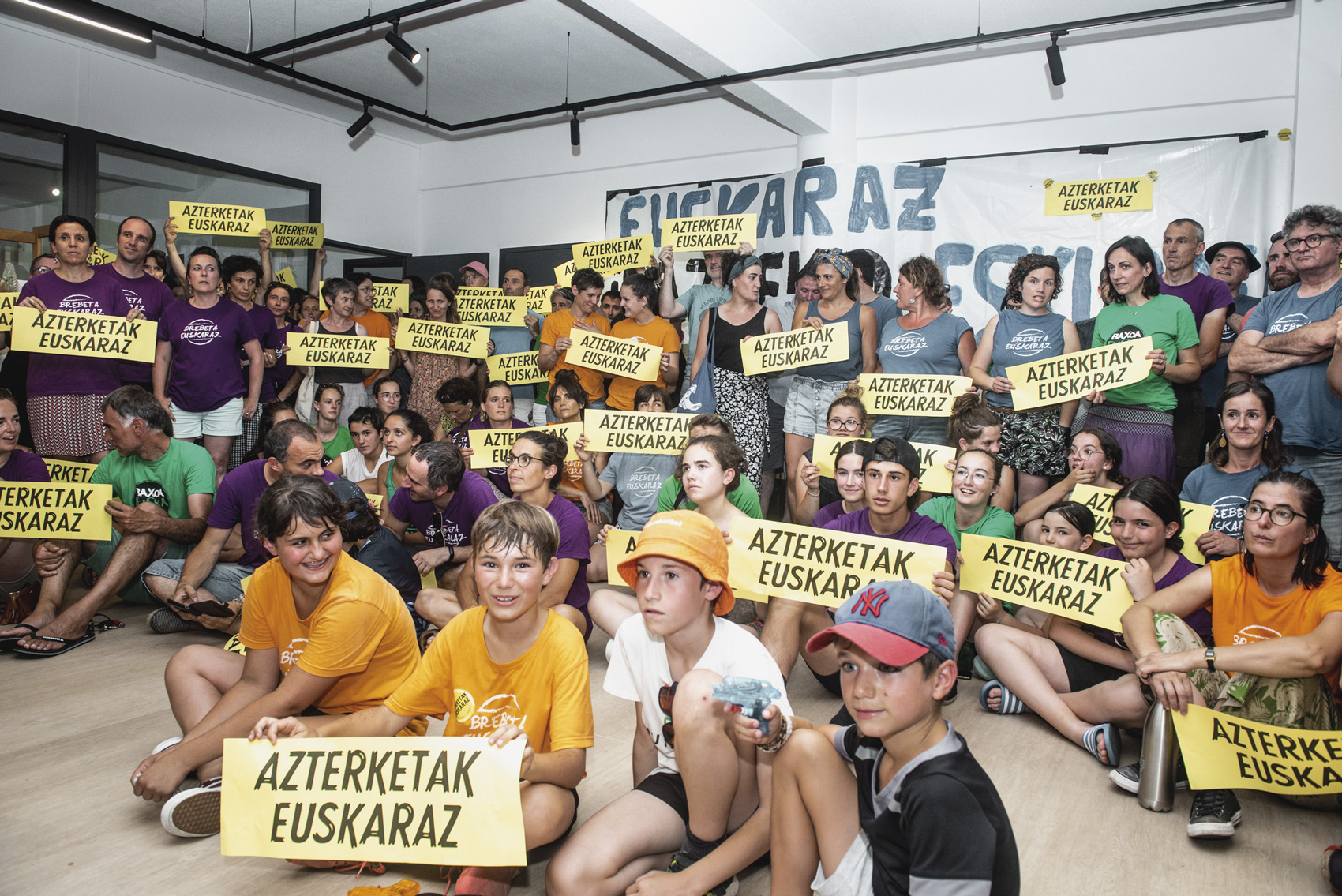Monolingual public posts in the Basque Country
- The obstacles for public services to be received in Basque represent a large number of headaches for the citizens, agents and municipalities of Navarra. The law of the artificially created linguistic border regulates that citizens of the Basque Country have the right to speak in Basque on the public road. However, workers in some sectors are not required to have knowledge of their own language and citizens are obliged to use Spanish. Many of these violations occur in the health system and in the library network.

The last Socio-linguistic Survey (2011) carried out by the Basque Government shows that in the Basque area 59.3% are bilingual and 12.6% are bilingual recipients. Thus, 71.9% of the total population is Euskaldun.
The health area of the Basque Country has 135 public jobs, of which the knowledge of the Basque Country is compulsory in 38 places. That is, only 28% of posts. In the case of librarians, firefighters, mountaineers and foreign policemen, the knowledge of the Basque language is considered a merit, but it is not mandatory. Therefore, in many cases it is the Castilian speaking people who occupy these places.
Serious effects of zoning
In the mixed area, the situation is more worrying, since in health and librarian jobs the profile of Euskera is not mandatory. It is only valued as merit in some jobs. In the non-vascophony zone, on the contrary, the situation is even more serious, since in no case is the linguistic profile mandatory or merit. Faced with this, the citizens of the mixed and non-Vascophony zone have very difficult or impossible to receive public services in Basque and communicate in a minority language with their workers.
The Government of Navarra does not want to publish data on the linguistic profiles of public jobs because "this is impossible to know". The numbers published so far are scarce, but at the same time very significant.
The Administration of the Foral Community has over 23,000 jobs, of which 302 are required to have compulsory knowledge of the Basque Country, representing 1.2 per cent of the total workforce. These data show that 19.2% of Euskaldunes throughout Navarre have no guarantee of the linguistic rights of their inhabitants.
English above the Basque Country
In contrast to this context, the most recent public job openings in Navarre have had English exams, and overcoming the test allows to increase the score by up to 10%. In this sense, in some oppositions to public positions, knowledge of the foreign language is valued and knowledge of it has no value.
Health care is wobbling
On many occasions, citizens have to call the Lekunberri health center to ask for the doctor's shift and to do so in Spanish. Indeed, the knowledge of the Basque Country was valued as a qualified merit at the time of the call for the post of administrative assistant. However, they did not choose Euskaldunes workers, although the number of Euskaldunes in Larraun-Lekunberri and Araraid-Betelu ranges from 75% to 80%.
The pediatrician who goes to the doctor with his son or daughter in Lesaka and substitutes him does not know Basque either, although legally he has established the linguistic profile V1 (B1 in writing and B2 in oral). The child is unable to express himself correctly in Spanish and to understand what the doctor says, so parents have to do as a translator. In the case of Leitza, Ultzama, Elizondo or Irurtzun pediatricians do not need to know Basque, so it is very common to adapt a Castilian speaking doctor.
The elderly couple of Elizondo has always talked in Basque with the family doctor and they have been well understood. When vacation or casualties have occurred, Osasunbidea has often sent his substitutes in Spanish, and have had some communication problems. But another doctor has retired and does not know Euskera. The main couple cannot go to the doctor's office alone, as they have difficulty expressing their illnesses and do not understand the doctor's recommendations well. Baztan is a municipality in Euskaldun, and more than 80% of its inhabitants know it, but only two out of six family doctors are required to have a basic profile of Euskera. The Director of the Health Center and the Head of Nursing also do not need to know the language of the same.
The sex educator at the women's care centers in Etxarri-Aranatz has been Euskaldun since the job was created. It has been dismissed and a substitute has been placed in Spanish because to work in the centers of attention to women no knowledge of Euskera is required. Consequently, the services previously received in Basque at the educational centers of Sakana are currently offered only in Spanish, although the percentage of students enrolled in model D in that region is 80%.
Child care programme in the waiting room of the Doneztebe Medical Center. Accidents in children. Among the fact sheets is the leaflet Cuide por ellos, which is published in Spanish in full. In addition, sick leave documents, medical certificates, mammography citations and written instructions for disease control are also complied with in Spanish, as the Osasunbidea software does not allow you to speak in Basque.
In those jobs that have an Euskera health profile, the level of knowledge is required V1. This basic level does not guarantee the communicative competence of a professional.
In the report on bilingualism and the situation of citizens’ linguistic rights published in 2010, Ararteko analyses other cases similar to complaints received annually on the Observatory’s telephone. As the Ombudsman warned the Government of Navarre, this situation affects the quality of health care provided to citizens.
Multilingual books vs. monolingual booksellers
The organic staff of librarians from Navarra in the Vascophony area of the public library network does not require bilingual profile staff. Therefore, librarians from Euskaldunes such as Altsasu, Aurizberri, Bera, Elizondo, Etxarri, Irurtzun, Leitza, Lesaka or Olazti do not need to know Basque.
The variety of materials found in libraries are closely related to language and the lack of knowledge of one of its official languages greatly affects the quality of the service offered.
In addition to infringing the right to the Basque language, the Basque Government has also created numerous problems, including the choice of means or organisation. Moreover, the lack of knowledge of Basque literature, music and film can make it difficult to issue recommendations.
Two years ago, the Department of Culture of Navarre offered 16 places for the position of Head of Library for its provision as opposition. In none of the jobs was the knowledge of the Basque Country mandatory, although some jobs were for the Basque area. In these cases, moreover, the knowledge of the Basque Country was not valued as a supplement, since it was a mere opposition, that is, there was no contest phase.
The Municipality of Bera sued the Government of Navarra in 2010 for a similar cause. He went to the Provincial Court of Navarra for not having asked for Basque knowledge for the position of librarian of the town. The ruling, which came out in October, specifies that the selection process will have to be repeated and the Basque country will have to be valued as a qualified merit.
People in the Basque Country but not jobs
The Law of the Vascuence, approved 28 years ago, recognizes the right of citizens to receive public services in Basque in the Basque Country. If this is not the case at the moment, the Administration must progressively move towards it, providing the necessary means to do so.
In 1989 the Government of Navarre set up a Euskaldunization Service for public sector officials and staff. Since then, hundreds of Navarros have been formed, but without any criteria or monitoring. There has been no Euskera plan drawn up by technicians and experts as indicated by the law, and no priority has been given to the officials of the posts for which bilingual staff are requested for the progressive Euskaldunization of the posts. Nor has any preference been given to staff performing public service tasks.
On the other hand, there has not been any follow-up on the use of language at work by officials who have been learning Euskera so far, nor has any control been carried out on the subject. After all, hundreds of people have been singled out, but jobs have not.
Nafarroako Gobernuaren hizkuntza politika murriztailearen ondorioz euskaldunon eskubideen urraketa sistematikoa da lurralde osoan. Egoera horren aurrean hainbat protesta, kexa eta kanpaina egin dira azken urteotan, baina Gobernuaren erantzuna axolagabea izan da etengabe.
Ikuspegi hori aldatzeko lanean buru-belarri dabil UEMA, Udalerri Euskaldunen Mankomunitatea. Herritarren % 70etik gora euskaldunak diren udalerriak biltzen ditu erakundeak. Denetara Euskal Herriko 72 udalerrik osatzen dute, horietatik 14 dira nafarrak eta guztira Nafarroako 35.000 biztanle inguru hartzen ditu bere gain.
Besteak beste, egoera soziolinguistiko eta zerbitzuen diagnosia egiteaz, udalerrien nahiz herritarren kasuak eta kezkak aztertzeaz, eta datuak publiko egiteaz arduratzen da. Horrez gain, UEMAko kideek behin baino gehiagotan eraman dute Parlamentura euskara eta zerbitzu publikoen afera.
Hizkuntza eskubideak berma daitezen plangintza kudeatzeko eta horretarako ezarri beharreko lehentasunak eta epeak zehazteko hartu-eman eta elkarlan iraunkorrerako gonbitea luzatu die erakundeak Osasunbideako eta Kultura Departamentuko zuzendaritzari. Ez diote jaramonik egin, ordea.
Euskararen Legea betearazteko bidean, UEMAk honako proposamenak planteatzen ditu, besteak beste. Batetik, eremu euskaldunean profil elebiduna eskatzea eta ordezkapenetan ere hori bermatzea. Bestetik, hizkuntza eskakizuna komunikazio gaitasuna ziurtatzen duen Europako Markoko C1 mailakoa izatea. Dagoeneko postu finkoa duten langileen kasuan, teknikariek gidatutako euskalduntze planean sartu eta berau ikas dezaten erraztasunak ematea –beti ere jendaurrean lan egiten dutenei lehentasuna emanez–. Horrez gain, paisaia linguistikoari dagokien afixak, informazio-orriak, aplikazio informatikoak eta baliabideak elebitan egotea ere eskatzen du Udalerri Euskaldunen Mankomunitateak.
























